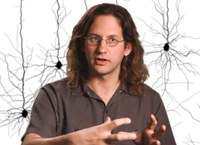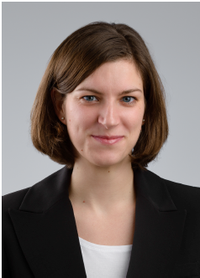3R Symposium
- Dr. Hermann Cuntz
-
Morphological modelling of neural circuits
Hermann Cuntz –born October 7, 1974 in Bielefeld– studied biology in Tübingen with an external PhD at the University of California at Berkeley and at the Max Planck Institute for Neurobiology. After two post-doc stays at Hebrew University in Jerusalem and at University College London, he moved to Frankfurt am Main. In 2013, he received the Bernstein Award and established his group at the Frankfurt Institute for Advanced Studies (FIAS) and the Ernst Strüngmann Institute (ESI) for Neuroscience in Cooperation with Max Planck Society. He studies principles of optimality in neuronal circuits with a special focus on single neurons and small networks.
- Prof. Dr. Thomas Dandekar
-
Boolean semiquantitative Models, Drug-minded interactomics and large-scale patient data: Our effort to refine, reduce and replace animal experiments
Thomas Dandekar studied medicine at the University of Munich from 1979 to 1986. He then worked as a medical doctor at the Max Planck Institute of Psychiatry, Department of Neuropharmacology, in Martinsried until 1986. He completed his habilitation in biochemistry at the University of Heidelberg in 1994. He spent his postdoctoral period in Paris at the Institute Pasteur until 1988, after which he continues to work as a scientist at the European Molecular Biology Laboratory Heidelberg. From 2000 to 2001 he worked as Reader (AR) for Bioinformatics at the Medical School Freiburg. Since 2001 he has been a full professor (C4), chair of Bioinformatics, Biocenter, University of Würzburg and since 2002 member of the board of directors of the Biocenter.
- Dr. Sarah Jeuthe
-
3Rs in experimental autoimmune myocardits using cardiac magnetic resonance imaging
Sarah Jeuthe, veterinary specialist for laboratory animal science, studied veterinary medicine at the Free University of Berlin and did her doctoral degree combined at the Charité University Medicine and the Free University of Berlin. From 2012 to 2017 she worked as a scientist at the Department of Cardiology of the German Heart Institute Berlin in the field of cardiovascular imaging and established a shared facility for preclinical MR imaging. Since September 2017 she works as an Animal Welfare Officer at the Max Delbrück Center for Molecular Medicine in Berlin-Buch. She is a member of the committee for farm animals of GV-SOLAS and of the Pool of Experts for the German National Committee for the Protection of Laboratory Animals.
- Dr. Jan Philipp Junker
-
Organism-wide lineage tracing and spatially-resolved transcriptomics – quantitative developmental biology with minimal animal numbers
Jan Philipp Junker studied physics at the Technical University of Munich. In 2009 he completed his Ph.D. in Biophysics under the direction of Matthias Rief. He spent his time as a postdoc in both the USA and the Netherlands. Since 2016 until now, he has been working as group leader at the Max Delbrück Center in Berlin at the Berlin Institute for Medical Systems Biology. In 2016 he received an ERC starting grant: SPACEVAR - Quantitative analysis of variability and robustness in spatial pattern formation [ https:// junkerlab.com ]
- Dr. Elliot Lilley
-
Strategies to avoid severe suffering of laboratory animals
Elliot Lilley is a Senior Scientific Officer within the RSPCA Research Animals Department, which works to achieve more effective ethical review of animal use and implementation of the Three Rs: http://science.rspca.org.uk/sciencegroup/researchanimals
He received his PhD in Pharmacology from King’s College London in 1997 and then began a 15 year career in the pharmaceutical industry; initially at the James Black Foundation and latterly at Novartis.
In 2012, he joined the RSPCA research animals department where his main areas of work relate to promoting refinement, including reducing severe suffering, experimental design, and translational validity. More information on our work towards ending severe suffering can be found here: www.rspca.org.uk/severesuffering
Elliot is a Fellow of the British Pharmacological Society and is animal ethics editor of the British Journal of Pharmacology.
- Dr. Krishnendu Mukherjee
-
The greater wax moth Galleria mellonella as an alternative model host for preclinical research
Krishnendu Mukherjee received his B. Sc. (2005) from Bangalore University, India and M.Sc. (2007) from Justus-Liebig University, Giessen, Germany followed by PhD (2007-2010) from the same university. He has 7 years of post-doctoral research experience from the Fraunhofer Institute for Molecular Biology and Applied Ecology, Germany. His scientific research interest broadly includes the development of alternative strategies for combating human pathogens. He has pioneered the use of the insect host Galleria mellonella as an alternative model host for preclinical research to investigate infections by human pathogenic bacteria and fungi. Dr. Mukherje is also utilizing different insect models to understand epigenetic basis of bacterial and fungal infections. He has authored over 20 research articles in the areas of Host-Pathogen Interactions and Epigenetics and was selected as a member in the German Research Foundation (DFG) youth academy on “Antibiotic resistance in urogenital infections-NAUGI” (2015).
- Prof. Dr. Jan-Bas Prins
-
Transition to animal free innovation, change in Dutch Policy
Jan-Bas Prins received his master’s degree with honors from the Wageningen University in the Netherlands. He went on to doing his PhD in Laboratory Animal Science with Prof. Dr. L.F.M. van Zutphen at the University of Utrecht. After post-doctoral projects at the University of Oxford, UK, and the Erasmus University, Rotterdam, The Netherlands he became the head of the pre-clinical division of the Department of Pulmonary Diseases at the Erasmus Medical Centre. In 2002, he took the position of Director of the Central Animal Facility of the Leiden University Medical Centre, LUMC, in the Netherlands. A position he still holds. He is Professor of Laboratory Animal Science at the LUMC and the University of Leiden. He is member of the Netherlands National Committee for the protection of animals used for scientific purposes. Jan-Bas Prins is a past-President of FELASA, Chairman of Laboratory Animals Ltd, Vice-President of the Institute of Animal Technology, Vice-chairman of the Scientific Committee of the Fondazione Guido Bernardini, Animal Welfare Officer and scientific advisor on animal welfare of Infrafrontier (IF2020), member of the External council for Comparative Medicine at the Karolinska Institute, Stockholm, Sweden and an AAALAC ad hoc specialist.
- Prof. Dr. Gerhard Püschel
-
Generation of a reporter cell line to assess neurotransmitter release: an unintended journey to 3R and beyond
Gerhard Püschel studied Human Medicine at the Christian-Albrechts-University Kiel and Biochemistry at the Indiana University, Bloomington IN, USA. In 1994 he qualified as a professor in Biochemistry at the Georg-August-University Göttingen. Since 2000, he is head of the Department of Biochemistry of Nutrition at the Institute of Nutritional Science at the University of Potsdam. In 2015, he received the Research Award of the State of Berlin to promote research into alternative methods for animal experiments for his project on the Development of a cell-based assay to determine the activity of botulinum Toxin.
- Prof. Dr. Blanca Rodriguez
-
Human in silico trials for cardiac pharmacology
Blanca Rodriguez is Professor of Computational Medicine at the University of Oxford. Her research is on investigating causes and modulators of variability in the electrophysiological response of the human heart to disease and medicines using multiscale computational modelling and simulation (www.cs.ox.ac.uk/ccs). She is actively engaged in training and career development of junior colleagues, and committed to promoting diversity and women in science, as key to the success of any organisation. Prof Rodriguez also acts as advisor in computational biomedical approaches to industry and organisations such as the Food and Drug Administration, the European Society of Cardiology, and the National Centre for the 3Rs of Animals in Research. She graduated as an Engineer from the Universidad Politecnica de Valencia, with a PhD in 2002. She then trained as a postdoc in the USA, before moving to Oxford in 2004, to become a Medical Research Council Career Development Fellow (2007-2013) and Wellcome Trust Senior Fellow (2013- ), prior to her current position.
- Prof. Dr. Thorsten Stiewe
-
3Rs in cancer research: Monitoring tumours with luciferases
Thorsten Stiewe studied medicine and chemistry in Essen and Baltimore (USA) in the years 1989-1997. He then completed his doctoral thesis at the Institute of Molecular Biology, Center for Cancer Research and Cancer Therapy, University of Essen. From 2002 to 2007 he worked as junior group leader at the Rudolf Virchow Center, DFG Research Center for Experimental Biomedicine, University of Würzburg. In 2006 he habilitated in Biochemistry and Molecular Biology, University of Würzburg, Germany. From 2007 to 2010 he is Professor (W2, tenure) of Molecular Oncology, Department of Haematology and Oncology, Philipps-University of Marburg (since 2010 Professor (W3, tenure). Since 2015 he has been Director of the Institute of Molecular Oncology and Head of Genomics Core Facility, Philipps-University of Marburg. He is a member of numerous scientific associations and was awarded the Hessischer Tierschutzforschungspreis (2014) and the C.G. Schmidt Medal (2007), among others.
- Prof. Dr. Maike Windbergs
-
Replacement of animal experiments by in vitro models
Maike Windbergs studied Pharmacy and her subsequent doctoral studies in Germany, Finland and the Netherlands were focused on biodegradable drug carriers. She performed a postdoctorate at Harvard University in the area of lab-on-a-chip techniques, before joining Saarland University and the Helmholtz-Institute for Pharmaceutical Research Saarland as a junior research group leader. In 2016, she joined the Buchmann Institute of Molecular Life Sciences at Goethe university as a full professor for pharmaceutical technology. On the search for novel therapies, her group is focusing on complex three-dimensional human cell and tissue models of epithelial barriers like skin, lung and intestine in particular to understand pathophysiological processes in the human body and to address the effect of pathophysiological changes (infection/inflammation) on the design of advanced drug carriers.











